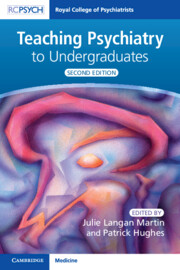Book contents
- Teaching Psychiatry to Undergraduates
- Teaching Psychiatry to Undergraduates
- Copyright page
- Contents
- Contributors
- Section 1 Principles of Medical Education
- Section 2 The Undergraduate Psychiatry Curriculum: Planning and Delivery
- Section 3 Clinical Placements in Psychiatry
- Section 4 Formal Teaching
- Chapter 4.1 How to Give a Lecture
- Chapter 4.2 How to Do Small Group Teaching
- Chapter 4.3 Case-Based Learning
- Chapter 4.4 Role Play and Experiential Learning
- Chapter 4.5 Simulation
- Chapter 4.6 Balint Groups for Medical Students
- Chapter 4.7 Teaching the Mental State Examination: An Example of Multimodal Teaching
- Section 5 Materials Development
- Section 6 Gathering feedback and quality improvement
- Section 7 Student Welfare
- Section 8 Developing as a medical educator
- Index
- References
Chapter 4.4 - Role Play and Experiential Learning
from Section 4 - Formal Teaching
Published online by Cambridge University Press: 12 October 2022
- Teaching Psychiatry to Undergraduates
- Teaching Psychiatry to Undergraduates
- Copyright page
- Contents
- Contributors
- Section 1 Principles of Medical Education
- Section 2 The Undergraduate Psychiatry Curriculum: Planning and Delivery
- Section 3 Clinical Placements in Psychiatry
- Section 4 Formal Teaching
- Chapter 4.1 How to Give a Lecture
- Chapter 4.2 How to Do Small Group Teaching
- Chapter 4.3 Case-Based Learning
- Chapter 4.4 Role Play and Experiential Learning
- Chapter 4.5 Simulation
- Chapter 4.6 Balint Groups for Medical Students
- Chapter 4.7 Teaching the Mental State Examination: An Example of Multimodal Teaching
- Section 5 Materials Development
- Section 6 Gathering feedback and quality improvement
- Section 7 Student Welfare
- Section 8 Developing as a medical educator
- Index
- References
Summary
This chapter explores role play as a type of experiential learning technique. The benefits of role play along with some of the challenges are considered. Role play in the virtual environment is discussed and the practical considerations for organising role plays are offered. Finally, the importance of assessing and evaluating role play scenarios are highlighted.
- Type
- Chapter
- Information
- Teaching Psychiatry to Undergraduates , pp. 97 - 101Publisher: Cambridge University PressPrint publication year: 2022



